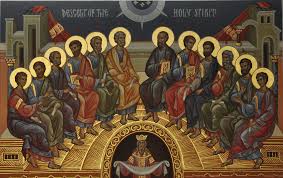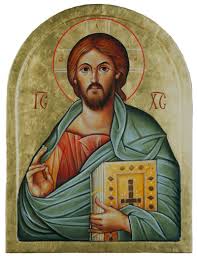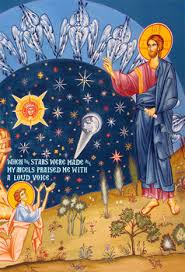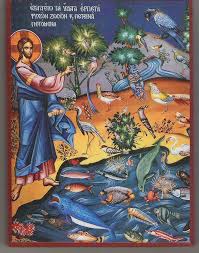1. The “Spirit of Disorganization”
Years ago the cowboy humorist Will Rogers said, “I don’t belong to any organized political party. I’m a Democrat.” I sometimes want to say, “I don’t belong to any organized Church. I’m Orthodox.” On the whole, the Orthodox Church is the most disorganized organization I have ever heard of – well, except for the U.S. Congress these days. But that’s ok for the Church, because in essence the Church is not an organization.
There really is no excuse for some of our disorganization: Written letters are often answered late if at all. I’m not going to tell you about when it was time for me to get an official letter allowing me to retire. Things are a bit better now in the age of e-mail, and I know 1 bishop who makes excellent use of it. (Thank you, Bishop Thomas.) Someone asked me, “How do you Orthodox select your bishops?” Well, some do it this way, some do it that way… It just sort of happens.
But much of our disorganization is intentional: Anciently, and still in the Orthodox Church, great councils of bishops have met (often only a minority of bishops have been present) and announced their decisions, and then it may take many years to find out whether the Church accepts them, whether they were Ecumenical Councils or not. (This is contrary to current Roman Catholic and even much Protestant practice, where decisions of councils and conventions are immediately enforced.) However, we Orthodox can’t even seem to get an international Pan-Orthodox Council together. We have been talking about one for decades. In 2016 His Holiness Bartholomew, the Ecumenical Patriarch finally held one, I think, but most bishops didn’t show up, so a real one is no closer now than it was 50 years ago. That is, unless the rest of the Church accepts the 2016 decisions (whatever they were – I don’t remember) and then… Meanwhile these days, at least at our Antiochian diocesan and national conventions in America, we do lots of socializing and very little business. Good!
Some years ago I asked a bishop to explain the Orthodox system to me. He said it is a sort of dialectic: bishops and councils send out directives, and then we try them out in practice to see if they work, and if they do they stick, and if they don’t they don’t. One great advantage of this disorganized system is that if someone wanted to try to change the Faith of the Orthodox Church, where would they grab hold?! And if someone wanted to alter our worship… some years back most American Orthodox liturgists decided that we need a common English translation of the Divine Liturgy in order to unite us – a good idea. So a commission put one together, and it did indeed unite us: everybody hated it! and that was the end of that.
So in that spirit, archbishops send out arch-episcopal directives, and sometimes people obey them and sometimes they don’t. Plans and programs are made and then often ignored or forgotten. Orthodoxy in America is chaotically divided jurisdictionally. There is considerable cooperation among us – the wonderful work of our American-originated International Orthodox Christian Charities, for example. But if someone tried to unite us all organizationally at this point, as in a business merger, there would be rebellion. The time is not right yet. We’ll know when it is.
My point is this: Whatever holds Orthodoxy together, united in the Apostolic Faith and in worship… it is definitely not our ability to get things organized.
And that is precisely the meaning of Pentecost! Well, I’m not sure the Holy Spirit intends us to be quite as dysfunctional as we often are. However, consider how the Church began. The way people usually form a new group is we hold a  meeting, call in delegates or whatever, get organized, write a statement of purpose, elect officers, and so on. That is not how the Church started. After the Ascension, the Apostles probably could hardly wait to get organized and get going. They had seen so much, they had so much to tell the world, so “let’s get this moving”. Instead Christ told them to go back to Jerusalem and… wait. Do nothing. Wait for the Holy Spirit. It must have about driven them up the wall. However for 10 days they waited, waited… till on Pentecost it was God the Holy Spirit and his power, not the Apostles and their organization, that gave life to the Church, that impelled the Church out into the world.
meeting, call in delegates or whatever, get organized, write a statement of purpose, elect officers, and so on. That is not how the Church started. After the Ascension, the Apostles probably could hardly wait to get organized and get going. They had seen so much, they had so much to tell the world, so “let’s get this moving”. Instead Christ told them to go back to Jerusalem and… wait. Do nothing. Wait for the Holy Spirit. It must have about driven them up the wall. However for 10 days they waited, waited… till on Pentecost it was God the Holy Spirit and his power, not the Apostles and their organization, that gave life to the Church, that impelled the Church out into the world.
Not that the Apostles didn’t then do some organizing: Who should carry the Good News where? How do we care for the needs of the poor? How do we celebrate the Holy Mysteries? But human organization was not what the ancient Church was all about. It never has been. Christ came and initiated the Church. The Holy Spirit came and empowered it. The Orthodox Church ever since has been held together, united, driven out to do what needs to be done not by human power and ingenuity and organization but, as Saint Paul put it, by “Christ the power of God and the wisdom of God. Because the foolishness of God is wiser than men, and the weakness of God is stronger than men.” 1 Corinthians 1:24-25
So the Church is not a human organization. It is the work of the Holy Spirit. It is the earthly manifestation, the epiphany of something heavenly, the Kingdom of God – with us human beings hanging on at the bottom of it, waiting for direction from on high. That is why all these new religious organizations founded by human beings come and go. That is why the Church is still here and will be to the end of the age.
Therefore it is still right for us to wait… to wait till the Spirit is moving, till the time is right, and God in his wisdom, through his Holy Spirit, sends us out. When is the right time? As with the Apostles, when it comes we won’t have to ask. (If you want a modern example, read my last Blog post.)
2. The Holy Spirit: A Person?
That the Holy Spirit is a Person is not obvious from the English word we use for him. “Spirit” sounds nebulous, ethereal, impersonal, like the “Spirit of ’76” or something. The ancient words which we translate as “spirit” (Hebrew “ruach”, Greek o πνεῦμα, pneûma, and Latin “spiritus”) are richer than our English “spirit”. They mean “spirit” and “wind” and “breath” – but none of these suggest a person. The odd old English title “Holy Ghost” is at least personal but subject to misinterpretation: I’ve seen Sunday School artwork showing the Holy Ghost dressed in a sheet and saying “boo!” – so that’s obviously not an adequate word either!
 So why do we believe the Holy Spirit of God is personal, a Person? one of the three Persons of God the Holy Trinity? Because Jesus said so. On Holy Thursday night (italics are added) he said, “And I will pray the Father, and He will give you another Strengthener* [“Advocate”, “Helper”, “Comforter”, “Paraclete”], that He may abide with you forever, the Spirit of truth, whom the world cannot receive, because it neither sees Him nor knows Him; but you know Him, for He dwells with you and will be in you.” John 14:15-17 “But when the Strengthener comes, whom I shall send to you from the Father, the Spirit of truth who proceeds from the Father, He will testify of Me. John 15:26 Case closed. And indeed 53 days after this, on Pentecost, the promised Holy Spirit came upon the Apostles
So why do we believe the Holy Spirit of God is personal, a Person? one of the three Persons of God the Holy Trinity? Because Jesus said so. On Holy Thursday night (italics are added) he said, “And I will pray the Father, and He will give you another Strengthener* [“Advocate”, “Helper”, “Comforter”, “Paraclete”], that He may abide with you forever, the Spirit of truth, whom the world cannot receive, because it neither sees Him nor knows Him; but you know Him, for He dwells with you and will be in you.” John 14:15-17 “But when the Strengthener comes, whom I shall send to you from the Father, the Spirit of truth who proceeds from the Father, He will testify of Me. John 15:26 Case closed. And indeed 53 days after this, on Pentecost, the promised Holy Spirit came upon the Apostles
* New Testament Greek is as close as we can get to what the Lord actually said, and “o Παράκλητος” is masculine. However, God is of course is beyond gender – not “he”, not “she”, and certainly not “it”.
Furthermore, on that night Christ prayed to his Father as from one Person to Another. So that gives us three distinct Personalities, three Persons within the One Godhead. There it is. Christ said so.
Note also: In the passage above, Christ said the Holy Spirit proceeds from the Father, and is sent by the Son. He did not say the Spirit proceeds from the Father “and the Son”. The “Filioque”, that Western addition to the Creed, no matter how well intentioned, is un-Scriptural. John teaches elsewhere (1:14, 3:16) that Christ is the only-begotten Son. So we have One God in Three Persons: the Father the origin of all, the Son begotten of the Father, the Spirit proceeding from the Father but sent by the Son. In Rublev’s icon of the Holy Trinity, angels symbolize what cannot be depicted. All 3 Persons are the same “age”, eternal. Both the Son and the Spirit incline towards their origin, the Father.
Do we understand all this? Of course not. Saint Basil the Great wrote somewhere that here we do not mean either 1 or 3 in the usual numerical sense! whatever that means, and I’m sure Basil didn’t know either. And remember that even the word Person is inadequate, as are all our words. God is super-personal, beyond personal. And was it Saint John of Damascus? who said (I paraphrase): We believe absolutely that the Son is begotten and the Spirit proceeds, but as to what “begotten” and “proceed” mean, we have no idea. These are only clues to the Reality of God, a little window into the unfathomable Mystery. I’ve quoted my old Methodist professor before: “We do well not to delve too deeply into the Family Life of God.”
3. The Pre-eternal, Ever-present Spirit
”In the beginning God created the heavens and the earth. The earth was without form and void, and darkness was upon the face of the deep, and the Spirit of God was moving over the face of the deep.” Genesis 1 The Holy Spirit was there “before” the beginning. (Of course, there wasn’t any “before” before the creation of time. I would interpret “the deep” to be whatever existed before Creation, behind the Big Bang. Where did the pre-eternal chaos come from? That probably cannot be answered from within our time and space, although astrophysicists are now working on it. Whatever was “over there”, God created that, too.) The Spirit of God, the breath of God, the wind of God, the  ruach, hovering over, overshadowing the unformed chaos. Then God spoke his Word – Christ the Word, the self-expression of God, the Logos of God, the ordered Reason of God, who was also “before” the beginning – and said: “‘Let there be light’, and there was light”. Her again Genesis and the astro-physicists agree: The cosmos was almost immediately filled with light. (See Neal deGrasse Tyson’s Astrophysics for People in a Hurry.) And so by the ordering of God’s Word and power of his Spirit our universe began to exist and to take form.
ruach, hovering over, overshadowing the unformed chaos. Then God spoke his Word – Christ the Word, the self-expression of God, the Logos of God, the ordered Reason of God, who was also “before” the beginning – and said: “‘Let there be light’, and there was light”. Her again Genesis and the astro-physicists agree: The cosmos was almost immediately filled with light. (See Neal deGrasse Tyson’s Astrophysics for People in a Hurry.) And so by the ordering of God’s Word and power of his Spirit our universe began to exist and to take form.
 Christ the Logos gives order to all things in the cosmos. God’s Holy Spirit moving invisibly within all things, behind all things, through all things, causes all things to exist, all things to move – from below the deepest depths within the sub-atomic world to the farthest reaches of our cosmos and beyond – creating not just once, billions of years ago, but always – now. (By the way, scientists and mathematicians now speak seriously about other worlds, other universes beyond our own. We Christians could have told them a thing or 2 about that! of the “many rooms in my Father’s house”.) If the Holy Spirit’s presence were removed for an instant we and all that is would simply cease to be.
Christ the Logos gives order to all things in the cosmos. God’s Holy Spirit moving invisibly within all things, behind all things, through all things, causes all things to exist, all things to move – from below the deepest depths within the sub-atomic world to the farthest reaches of our cosmos and beyond – creating not just once, billions of years ago, but always – now. (By the way, scientists and mathematicians now speak seriously about other worlds, other universes beyond our own. We Christians could have told them a thing or 2 about that! of the “many rooms in my Father’s house”.) If the Holy Spirit’s presence were removed for an instant we and all that is would simply cease to be.
Let’s say it positively. “Where can I go then from Your Spirit?” asked the Psalmist. “Or where can I flee from Your presence? If I ascend into heaven, You are there; If I make my bed in hell, behold, You are there. If I take the wings of the morning, and dwell in the uttermost parts of the sea, even there Your hand shall lead me, and Your right hand shall hold me. If I say, ‘Surely the darkness shall cover me,’ even the night shall be light about me. Indeed, the darkness and the light are both alike to You.” Psalm 138 (139) 7-12
“O heavenly King, Comforter, Spirit of truth, who are in all places and fill all things; Treasury of good things and Giver of life: Come and dwell in us and cleanse us from every stain, and save our souls, O Good One.”
Next Week: 3 more thoughts about Pentecost
In 2 weeks: All the Saints of North America
